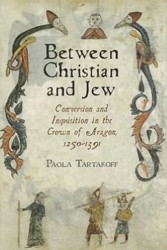In this study, Tabea Linhard explores the practical applications of the term “Jewish Spain.” Starting from the premise that Spain was never actually Jewish (though parts of the Iberian Peninsula might have been), she asserts that the contradictory forces of “philo-Sephardism” and “anti-Semitism” collide in the process of conjuring up what the contemporary population describe as “memory” of Jewish Spain.
The nostalgic view of philo-Sephardism looks to a distant past of convivencia in which Jews, Muslims, and Christians lived together in peace prior to the Christian conquest of the Iberian Peninsula. The Jews of this distant time are typically described as “yearning for Sepharad” and as speaking their own “melodic” form of Spanish, which has come down to us as Ladino. In fact, this yearning did not actually emerge until long after the convivencia—after the Jews had been expelled from Spain in 1492. How could the Jews of the convivencia express nostalgia for a land from which they had not yet been expelled? Then too, as Linhard makes clear, “the ‘Spanish’ that only Jews spoke attained its melodic quality only after the Sephardic Jews had been exiled” from the land in which it originated.
A similarly inaccurate laudatory memory can be found in describing the manner in which a number of Jews bearing Spanish passports were saved during the Holocaust, an idea which has given rise to the belief that Spain so loved its Jews that the administration was willing to fight to protect them from the Nazis. The reality, however, suggests that the Spanish people actually maintained a very different attitude toward the Jews, in which the 1492 expulsion, the Spanish Civil War, and the Holocaust, though in no way comparable and certainly not interchangeable, “appear to be joined in a ‘persecutory landscape.’ ”
Linhard argues that “memory” in Spain is multidirectional, and that while the current population may preserve a certain nostalgia regarding the Jews of the past, that same population has “one of the highest levels of anti-Semitism in Europe.” She concludes, in fact, that the ambivalence surrounding “Jewish Spain” might derive from the reasoning “that Jews in Spain are acceptable as long as their presence is far away in time (before 1492) or far away in place, locked in a silver screen that bears no relation to Spain’s realities.” A probing investigation into the nature of “memory,” this book provides an alternative approach to the Jewish-Spanish relationship in the twentieth century and as such is an important resource for academic libraries and interested individuals.
Related content:
- Reading list on Sephardic Jewry
- Hunting Family Ghosts by Doreen Carvajal
- Celebrating the Global People by Charles London





